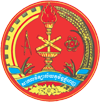Background

Cambodia supports a rich biodiversity yet is one of the least known countries worldwide. In addition to forming an important part of the Indo-Burma Hotspot, containing four Global Ecoregions and 40 Important Bird Areas, it possesses many of the best remaining forests and wetlands in mainland Southeast Asia, with countless endemic and globally threatened species. Though knowledge of Cambodian biodiversity remains limited, recent years have seen an astonishing rise in the number of species documented (Daltry, 2008; 2011). Much of this research has been led by international biologists however, due to the chronic shortage of Cambodian scientists. As a consequence, Cambodia’s current ability to manage its natural heritage is severely hampered both by a lack of skilled people and biological information.
As the country moves towards greater development and prosperity, there needs to be a clearer understanding of how to manage and use its natural heritage wisely. Natural resources are the mainstay of Cambodia’s economy: more than 80% of Cambodians depend directly on natural resources for subsistence and income, and all utilize wild resources such as fish and timber. With pressures on biodiversity and the environment increasing, there is a risk of losing much of this natural wealth forever; to the detriment of present and future generations. As a result, the lack of national capacity and reliable biodiversity data has been highlighted in all recent priority-setting exercises, including the National Biodiversity Strategy and Action Plan (NCSD, 2016).
The Masters of Science in Biodiversity Conservation was established in 2005 to address the urgent need for qualified conservationists to guide Cambodia towards sustainable development, address existing knowledge gaps, and uphold the nation’s commitments to conserving its biodiversity. Partner organisations assisting the Masters programme include:
-
Angkor Centre for Conservation of Biodiversity, Cambodia
-
Bat Conservation International, USA
-
Conservation International, Cambodia
-
Conservation Leadership Programme, UK
-
Copenhagen Zoo, Denmark
-
Critical Ecosystems Protection Fund, USA
-
Darwin Initiative, UK
-
Fishery Administration
-
Free the Bear
-
Harrison Institute, UK
-
Helping Address Rural Vulnerabilities and Ecosystem Stability Program, Cambodia
-
Hungarian Natural History Museum, Hungary
-
Institut Pasteur du Cambodge
-
International Crane Foundation, USA
-
John D. and Catherine T. MacArthur Foundation, USA
-
Kamchaiymea University
-
Kannitha Fund, Australia
-
King Mongkut’s University of Technology, Thailand
-
La Sierra University, USA
-
Margaret A. Cargill Foundation, USA
-
Meanchey University
-
Ministry of Environment, Cambodia
-
Ministry of Agriculture, Forestry and Fisheries, Cambodia
-
Museum National d’Histoire Naturelle, France
-
North Carolina Museum of Natural Sciences, USA
-
Prince of Songkla University, Thailand
-
Royal Botanical Garden Edinburgh, UK
-
Rufford Foundation, UK
-
Savaiyreang University
-
Scientific Capacity Development Initiative, Cambodia
-
Swedish International Development Cooperation Agency (SIDA)
-
Texas State University, USA
-
Texas Tech University, USA
-
US Fish and Wildlife Service
-
US Agency for International Development
-
Vietnam-Russia Tropical Centre, Vietnam
-
Wildlife Conservation Society, Cambodia
-
Wonder of Mekong
-
World Bank
-
WorldFish, International
-
Zoological Parks and Gardens Board of Victoria, Australia
References:
Daltry, J.C. 2008. Editorial – Cambodia’s biodiversity revealed. Cambodian Journal of Natural History, 2008(1): 3-5.
Daltry, J.C. 2011. Editorial – Finders, keepers. Cambodian Journal of Natural History, 2011(2): 77-78.
National Council for Sustainable Development (2016) National Biodiversity Strategy and Action Plan. Ministry of Environment, Royal Government of Cambodia.
Contact Info

- Ms. Meas Seanghun
- Tel: (+855)12 370 886
- Ms. Hak Kosal
- Tel: (855)17 482 855
- Email: mbiodiversity.info(at)rupp.edu.kh
- Office: Room #415, Campus I
Student Life

Foreign students who are interested in studying in Cambodia should first approach their national government. read more...
